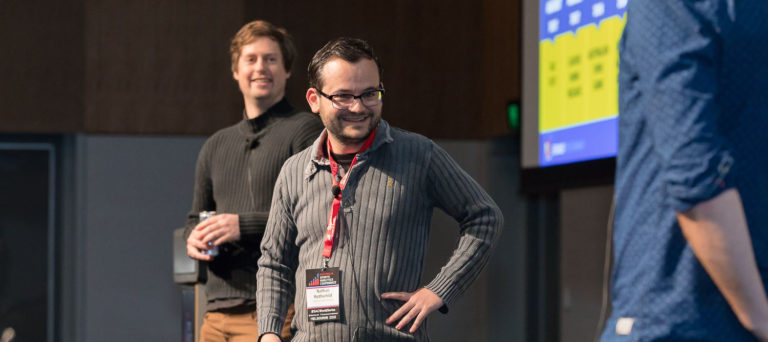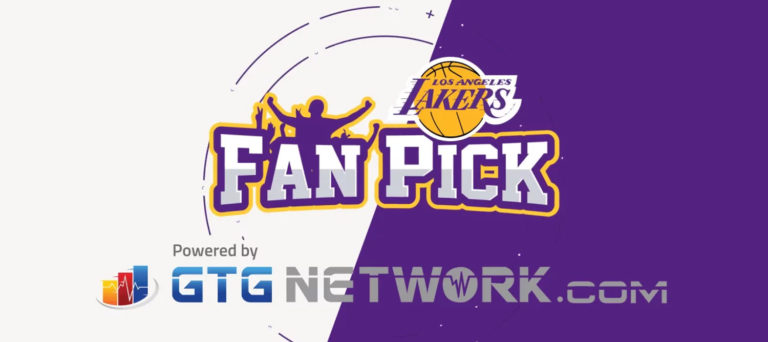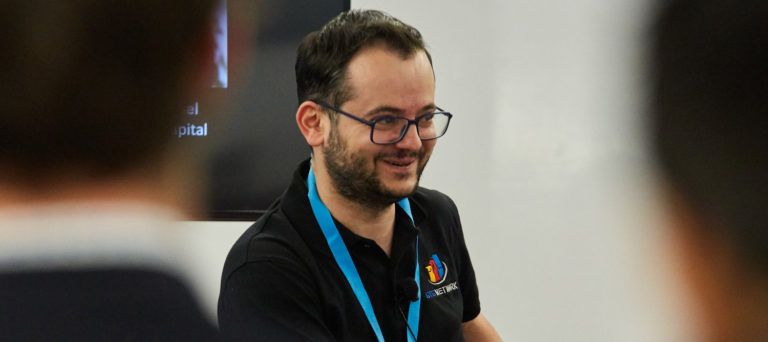
The secrets behind global expansion, and landing game-changing clients
A Fireside Chat with GTG Network
We sat down with the Melbourne based founders of GTG Network (formerly Genius Tech Group), Nathan Rothschild and Jared Hopping. The conversation formed part of Startupbootcamp’s Melbourne Sports & EventTech Accelerator Program, and looks at how Nathan and Jared tackled the struggles of the start-up life, getting their first client, expanding overseas, and bringing on game-changing clients.
GTG are no strangers to STWS and have been a regular feature at our global sports tech conferences. Founded in 2012, GTG specialised in the creation of unique technology in the data analytics, content production and gamification spaces. However, in recent years they have transformed into an international powerhouse providing insights and products for the likes of DraftKings, Paddy Power and the Los Angeles Lakers.
We’ll start with a traditional question straight off the bat, how was GTG Network founded?
Nathan Rothschild: We started out on Facebook around 2012, primarily focused around sports betting tips for NBA. As we quickly grew we were getting a lot of people reaching out to us from a sports data perspective, including betting companies themselves. In 2013-14 we spent a lot of time doing market research and due diligence to confirm demand for a holistic sports data platform, which in 2015 we rolled out in the form of iSportGenius, to help serve betting companies.
What we discovered through this process was that you can gamify literally anything. This opened doors outside sport, including arcade games, which didn’t exactly fit with our original space of betting, but fit well with our mantra at GTG of consumer engagement. So whether it’s prediction gaming, stats or arcade games, everything we’ve done has been a consumer-facing proposition.
Jared Hopping: We identified a niche in the market where there was no equivalent to a “racing form guide” for horse racing that translated to the wider sports market. We originally researched with that goal in mind, which then lead down the path of prediction gaming which scaled quite well. The transition to arcade games after that was rather simple for us, as we were already in the sports mindset, creating arcade games to further serve our market made sense.
Prior to expanding overseas, how did you gain your initial traction here in Australia and sign your first client?
NR: It’s probably our most remarkable sales story to-date, we were in talks with a few potential partners, and we were lucky enough to get introduced to the CEO of Ladbrokes Dean Shannon. Surprisingly, we were able to get a deal signed very quickly, which was definitely on the contrary to our expectations when it came to larger, more lucrative agreements. However, it did make us think that all deals would be that easy moving forward, but they weren’t; we faced the same struggles that most companies do with brining in new clients in the early stages. To this day we still have a strong relationship with Dean though, and Ladbrokes continue to be a really important client to us.

In recent years you’ve seen a considerable amount of acceleration, which a lot can be pegged to your 2018 deal with Draft Kings, how did that come about?
NR: It’s a great example of you never know where a meeting or a conference presentation might lead. Our story with DraftKings dates back to 2016 where I was speaking at conference in London, and in the audience was their Chief International Officer Jeffrey Haas. He came up to me after my presentation, thought what we were doing was really interesting and wanted to chat about it further. At the time, this was before online sports betting in the United States was much more prevalent, and was mostly still illegal. But as laws relaxed in 2018, and DraftKings were looking to launch their SportsBook offering in the US, the relationship I had garnered with Jeffrey in 2016 came to the fore and we were able to work closely and launch our product with them in August 2018 and to this day are a client of ours.
DraftKings are a really significant institution with a market cap of over $USD10b and a database of over 10 million users, which is just a different quantum than we’d had to deal with our Australian clients to that point. It’s been super exciting and given us serious exposure and helped to grow our international profile.
GTG has had some extensive experience working in the sports betting sector, what are some of the key things you’ve learned about working with betting companies and large scale corporations in general?
NR: When you’re dealing with large corporations such as these, it’s crucial to have a premium product to offer their end of the market. Reliability, scalability and quality in both your front-end and back-end is essential, but also the ability to customise and pivot to suit whatever need they have. It’s something that you can see through our portfolio that we’ve had a major focus on, each client has a different product, it’s powered by the same technology, but the appearance and utilisation does vary between them. When you’re going after the “big dogs”, that ability to service their customised needs is what’s going to get you their business.
JH: One of the big points of differentiation we have is our customer service, we work hours that suit our major clients, which sees us working at a minimum until 2:30am AEST. We’re really dedicated to what we do and that comes through to them, in a world where instant messaging is being used more than ever, we don’t wait to respond to clients when it best suits us; so a big part of our differentiation is making sure we’re on top of that client communication.
In regards to product, in the beginning we literally looked at what was out there in the market, and made it better. Before you speak to anybody, you want to know what they’re currently using and make sure you can absolutely smash their current solution out of the water.
Possibly your biggest scalp to date came about last October, reaching a partnership with the Los Angeles Lakers; how valuable has that partnership been in securing future business?
NR: Of all of our partnerships, perhaps the most exciting has been the Lakers, and is an important reflection of our transition from servicing mainly the wagering industry to the sports industry in general. The size, the scale and most importantly the reputation of the Lakers has been amazing for us. Other sports teams look at them as the pillar of what you should do as a business, and to be considered and partnering with them has been a major benefit to us and to our reputation.
Another big thing that we’ve benefited from the partnership with the Lakers is the PR as a result of that partnership. The LA Times, Forbes, and other notable publications all wrote about the partnership when it was announced. In turn with such a high readership with those publications, I was receiving LinkedIn connection requests and messages from those that I would normally be trying to chase. The PR element of the Lakers partnership really helped cement it as a true milestone for GTG Network.
As you’ve now matured and gain significant traction in the data insights space, you’ve also managed to transform into the gamification scene – as seen with the Lakers partnership, how did that maturation come about, and what drew you to gamification as a potential vertical?
JH: From a product roadmap style, we always started small, and we continue to innovate today. We obviously want to make sure we stay on top of what we’ve already got, updating our current solutions to stay ahead because we know we have competitors hot on our heels trying to push into this space. We’ve got many years and millions of dollars behind us, so for us the innovation leads us into the gamification. We saw the market need, and we saw a way to fill that with a different product with our breadth of experience and personnel.

Bringing up the elephant in the room, COVID-19, how have you adapted, with so much sport on-hold over the past months, as well as doing remote tech management?
NR: I think we’ve been able to leverage one of the advantages of being a slightly more mature business, and that’s having a diversified portfolio. Prediction and data analytics are heavily reliant on sport, so that was put on pause, but with the other products in our suite, and our tech team, we’ve been able to pivot quite easily to what we could capitalise on in the current situation. A big focus was put onto our arcade games, as they didn’t need any sport to be playing in order to function, and we began deploying the trivia-based games. It also included realising that other data analytics competitors that relied so heavily on sport being played, that we could have the opportunity to expand through the strength of our portfolio, and have actually gained business in this trying time.
The current health situation is also a reminder of always staying agile, starting out as three staff and now many more, we’ve tried to maintain our agility of our early days, by leveraging the strengths of our significant tech team. We’ve obviously done quite well so far throughout this current crisis, but are very mindful that there is still so much unknown, and we’re definitely vulnerable to adaptations of the virus and are not in denial about that.
JH: In terms of understanding about what the world of sport was doing as this virus hit and major sports stopped, there was actually sport still on. The Belarussian Premier League for example just kept going throughout this period, so in turn we started doing data for that league. We wanted to continue innovating through this period, so we looked to leagues like this that were still running to still provide our stats offering, as well as developing our arcade games.
Another thing we did during this period was cleaning out our tech stack with underused tools. We were paying for some tools that we were educating our team on slowly, the reality was we weren’t using them yet, so we made strategic decisions to cut expenses where it wasn’t making an impact on our day-to-day operations, and that was just as important as securing revenue for us. Nathan had a tough time figuring everything out because we obviously had a lot of incoming revenue that had stopped, but we were fortunate enough to maintain our ability to be nimble.
NR: And I guess it’s another factor of being a mature business that when it comes to the P&L and balance sheet, there comes a certain solidity, and I’m very grateful that we’re combating this now rather than 3-4 years ago in our infancy.

One thing that I flagged in a recent conversation with you Jared was your method of developing new vertical prototypes with a lean mindset, could you unpack that for the teams here in the program?
JH: It’s not scientific in any way, shape or form, but we’re all about keeping things lean and trying to close deals in a way that’s scalable. An initial product or prototype should never take too much time as you’ll end up building something that doesn’t service the end user. In order to close deals, we definitely put a high focus and priority on design, and making sure that’s rock solid. If you can pull up an image on a big screen or run them through a slideshow of the user experience, or talk them through a user interface, it makes selling much easier. It helps us manage resources, it allows us to pitch a lot of deals at once, and enables us to pre-empt future deals that we want to have in the pipeline.
Nathan, a way that we’ve got to know each other quite well over the recent years has been through events and conferences, one thing you wanted to stress was the value of networking and attending events. How valuable have events been to your substantial growth?
NR: Networking and attending events is something that it doesn’t matter what stage of the business you’re at, it’s critical to do. If I wasn’t on a plane to London in 2016 we wouldn’t have the DraftKing’s partnership and the knock-on effects of that. You’re never quite sure who you may run into that these events, sometimes you think they’re going to be great and they’re not, but then there’s also ones that you don’t think will be that good but can be extremely valuable. I’ve been to countless conferences mainly just to meet the people there, and it’s astounding the leads you can find from just going to events.
Obviously at the moment you can’t attend conferences in person, but the same principle applies to online events and digital summits. Networking through these digital events is also being encouraged with chat room features and the ability to connect with other attendees. One major thing when networking is never jump straight into a sales pitch, as it’s much more likely to piss someone off rather than have them buy into your idea and want to work with you. Networking through LinkedIn is a great resource, and can give you access to a global list of leads, but just keep in mind that you’re not the only one doing it, and your success rate won’t be very high.
On the Sports Tech World Series conferences, I’ve been to Dallas a few times to present as well as here in Melbourne, and they’ve been amazing in terms of the people you can meet. It’s also a great opportunity to present with partners, as we’ve had the privilege of presenting at the Melbourne conference with Sportsbet in recent years. It’s also a chance for some of the lesser known faces of the company to represent us externally and let them be proud of what they’ve provided through GTG.
Additional Resources:
Nathan moderated a sports betting panel featuring Wayne Kimmel from SeventySix Capital, and Nicole Metzgar-Schall from Sportradar at our 2019 USA Sports Tech Conference – listen here.
Learn more about the Startupbootcamp Sports & EventTech Accelerator Program here.
Learn more about GTG Network here: https://www.gtgnetwork.com/
__
Justin Harman is the Operations Manager of Sports Tech World Series, the world’s largest community for Sports Technology professionals, as well Brand Communications Manager for the Australian Sports Technologies Network.
